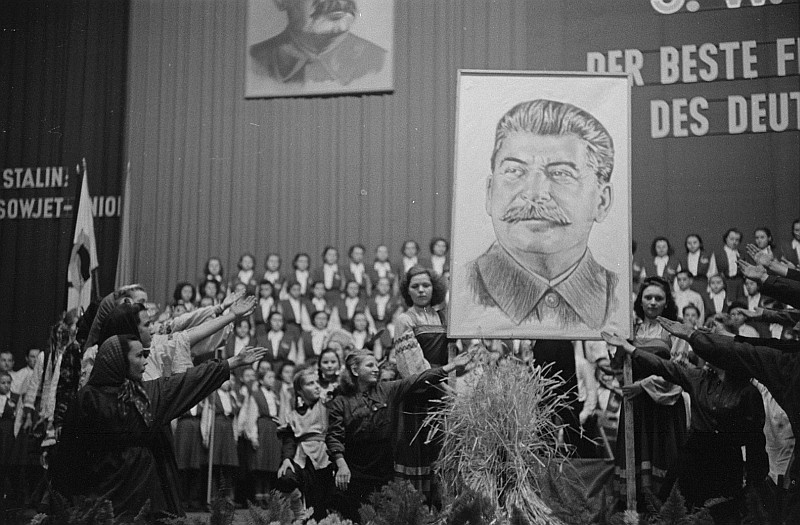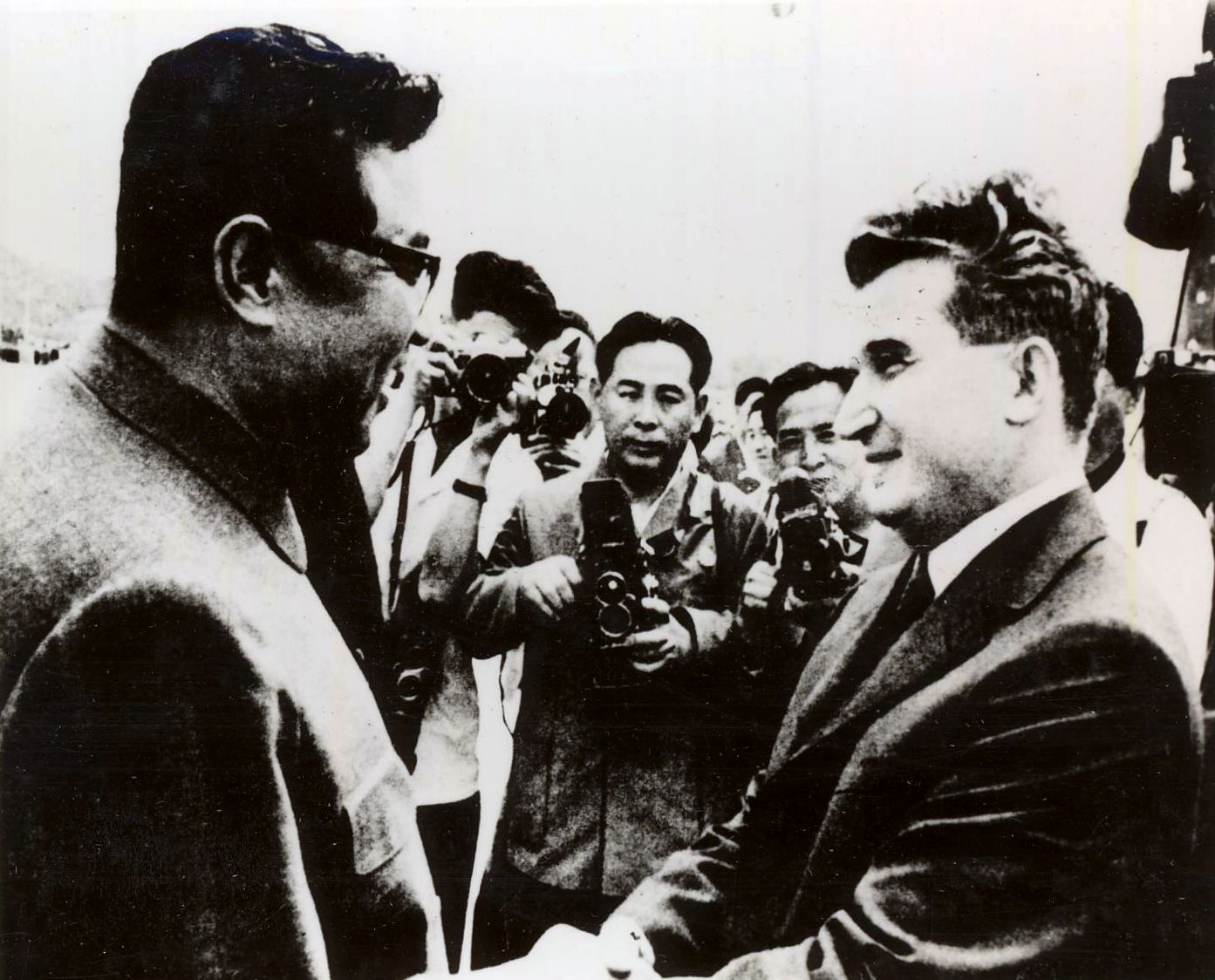|
De-Stalinization In Romania
The De-Stalinization in Romania was a process of removing Stalinist policies and Stalin's cult of personality between 1959 and 1965. Implemented by Gheorghe Gheorghiu-Dej, it included the marginalization of Stalinists such as Ana Pauker and a large-scale amnesty of thousands of political prisoners. A number of political and cultural figures from the 19th century fight for independence were rehabilitated and writers formerly considered "bourgeois decadent" (like Tudor Arghezi) were allowed to publish again.Deletant, p. 172 It marked the beginning of a period of liberalization in Communist Romania, which ended in 1971 with the July Theses returning the country to the Totalitarian side which was renamed Ceauşism. Changes in placenames Many placenames, companies and institutions had been named after Stalin and the "classics of Marxism", as well as Romanian Communist heroes. Most of these were reverted in the 1960s. This began in 1962, with the reverting everything that was named aft ... [...More Info...] [...Related Items...] OR: [Wikipedia] [Google] [Baidu] |
Stalinist
Stalinism is the means of governing and Marxist-Leninist policies implemented in the Soviet Union from 1927 to 1953 by Joseph Stalin. It included the creation of a one-party totalitarian police state, rapid industrialization, the theory of socialism in one country, collectivization of agriculture, intensification of class conflict, a cult of personality, and subordination of the interests of foreign communist parties to those of the Communist Party of the Soviet Union, deemed by Stalinism to be the leading vanguard party of communist revolution at the time. After Stalin's death and the Khrushchev thaw, de-Stalinization began in the 1950s and 1960s, which caused the influence of Stalin’s ideology begin to wane in the USSR. The second wave of de-Stalinization started during Mikhail Gorbachev’s Soviet Glasnost. Stalin's regime forcibly purged society of what it saw as threats to itself and its brand of communism (so-called "enemies of the people"), which included polit ... [...More Info...] [...Related Items...] OR: [Wikipedia] [Google] [Baidu] |
Stalin's Cult Of Personality
Joseph Stalin's cult of personality became a prominent feature of Soviet popular culture in 1929, after a lavish celebration of his purported 50th birthday. For the rest of Stalin's rule, the Soviet press presented Stalin as an all-powerful, all-knowing leader, with Stalin's name and image appearing everywhere. Historian Archie Brown sets the celebration of Stalin's 50th birthday on 21 December 1929 as the starting point for his cult of personality. Stalin's image in propaganda and the mass media The building of the cult of personality around Stalin had to proceed judiciously, as British historian Ian Kershaw explains in his history of Europe in the first half of the 20th century, ''To Hell and Back'': A Stalin cult had to be built carefully. This was not just because the man himself was so physically unprepossessing – diminutive and squat, his face dominated by a big walrus mustache and heavily pitted from smallpox – or that he was a secretive, intensely p ... [...More Info...] [...Related Items...] OR: [Wikipedia] [Google] [Baidu] |
Gheorghe Gheorghiu-Dej
Gheorghe Gheorghiu-Dej (; 8 November 1901 – 19 March 1965) was a Romanian communist politician and electrician. He was the first Communist leader of Romania from 1947 to 1965, serving as first secretary of the Romanian Communist Party (ultimately "Romanian Workers' Party", PMR) from 1944 to 1954 and from 1955 to 1965, and as the first Communist Prime Minister of Romania from 1952 to 1955. Born in Bârlad (1901), Gheorghiu-Dej was involved in the communist movement's activities from the early 1930s. Upon the outbreak of World War II in Europe, he was imprisoned by Ion Antonescu's regime in the Târgu Jiu detention camp, and escaped only in August 1944. After the forces of King Michael ousted Antonescu and had him arrested for war crimes, Gheorghiu-Dej together with prime-minister Petru Groza pressured the King into abdicating in December 1947, marking the onset of out-and-out Communist rule in Romania. Under his rule, Romania was considered one of the Soviet Union's mos ... [...More Info...] [...Related Items...] OR: [Wikipedia] [Google] [Baidu] |
Ana Pauker
Ana Pauker (born Hannah Rabinsohn; 13 February 1893 – 3 June 1960) was a Romanian communist leader and served as the country's foreign minister in the late 1940s and early 1950s. Ana Pauker became the world's first female foreign minister when entering office in December 1947. She was also the unofficial leader of the Romanian Communist Party immediately after World War II. Biography Early life and political career Pauker was born into a poor, religious Orthodox Jewish family in Codăești, Vaslui County (in central Moldavia), the daughter of Sarah and (Tsvi-)Hersh Kaufman Rabinsohn. Her father was a traditional slaughterer and synagogue functionary, her mother a small-time food seller. They had four surviving children; two more died in infancy. As a young woman, she became a teacher in a Jewish elementary school in Bucharest. While her younger brother was a Zionist and remained religious, she opted for Socialism, joining the Social Democratic Party of Romania in 1915 an ... [...More Info...] [...Related Items...] OR: [Wikipedia] [Google] [Baidu] |
Political Prisoner
A political prisoner is someone imprisoned for their political activity. The political offense is not always the official reason for the prisoner's detention. There is no internationally recognized legal definition of the concept, although numerous similar definitions have been proposed by various organizations and scholars, and there is a general consensus among scholars that "individuals have been sanctioned by legal systems and imprisoned by political regimes not for their violation of codified laws but for their thoughts and ideas that have fundamentally challenged existing power relations". The status of a political prisoner is generally awarded to individuals based on declarations of non-governmental organizations like Amnesty International, on a case-by-case basis. While such status are often widely recognized by the international public opinion, they are often rejected by individual governments accused of holding political prisoners, which tend to deny any bias in the ... [...More Info...] [...Related Items...] OR: [Wikipedia] [Google] [Baidu] |
Tudor Arghezi
Tudor Arghezi (; 21 May 1880 – 14 July 1967) was a Romanian writer, best known for his unique contribution to poetry and children's literature. Born Ion N. Theodorescu in Bucharest, he explained that his pen name was related to ''Argesis'', the Latin name for the Argeș River. Biography Early life He graduated from Saint Sava High School in October 1896, started working to pay for his studies, and made his debut in 1896, publishing verses in Alexandru Macedonski's magazine ''Liga Ortodoxă'' under the name ''Ion Theo''. Soon after, Macedonski, the herald of Romanian Symbolism, publicized his praise for the young poet: "This young man, at an age when I was still prattling verses, with an audacity that knows no boundaries, but not yet crowned by the most glittering success, parts with the entire old versification technique, with all banalities in images in ideas that have for long been judged, here and elsewhere, as a summit of poetry and art." He began stating his admirati ... [...More Info...] [...Related Items...] OR: [Wikipedia] [Google] [Baidu] |
Liberalization
Liberalization or liberalisation (British English) is a broad term that refers to the practice of making laws, systems, or opinions less severe, usually in the sense of eliminating certain government regulations or restrictions. The term is used most often in relation to economics, where it refers to economic liberalization, the removal or reduction of restrictions placed upon (a particular sphere of) economic activity. However, liberalization can also be used as a synonym for decriminalization or legalization (the act of making something legal after it used to be illegal), for example when describing drug liberalization. In economy and trade The Great Depression of 1929 made nations throughout the world realize that the wide gap between the economic theory and practice in determination of internal trade policy was the major cause of worldwide economic disaster. Therefore, a need for reviving the classical theory of trade by adhering to free trade policy was felt. The Bretton W ... [...More Info...] [...Related Items...] OR: [Wikipedia] [Google] [Baidu] |
Communist Romania
The Socialist Republic of Romania ( ro, Republica Socialistă România, RSR) was a Marxism–Leninism, Marxist–Leninist One-party state, one-party socialist state that existed officially in Romania from 1947 to 1989. From 1947 to 1965, the state was known as the Romanian People's Republic (, RPR). The country was an Eastern Bloc state and a member of the Warsaw Pact with a dominant role for the Romanian Communist Party enshrined in :Template:RomanianConstitutions, its constitutions. Geographically, RSR was bordered by the Black Sea to the east, the Soviet Union (via the Ukrainian Soviet Socialist Republic, Ukrainian and Moldavian Soviet Socialist Republic, Moldavian SSRs) to the north and east, Hungarian People's Republic, Hungary and Socialist Federal Republic of Yugoslavia, Yugoslavia (via Socialist Republic of Serbia, SR Serbia) to the west, and People's Republic of Bulgaria, Bulgaria to the south. As World War II ended, Kingdom of Romania, Romania, a former Axis powers, A ... [...More Info...] [...Related Items...] OR: [Wikipedia] [Google] [Baidu] |
July Theses
The July Theses ( ro, Tezele din iulie) is a name commonly given to a speech delivered by Romanian leader Nicolae Ceaușescu on July 6, 1971, before the Executive Committee of the Romanian Communist Party (PCR). Its full name was ("Proposed measures for the improvement of political-ideological activity, of the Marxist–Leninist education of Party members, of all working people"). This quasi-MaoistCioroianu, p. 489.Liiceanu, p. xviii.Tismăneanu, p. 241 speech marked the beginning of a "mini cultural revolution"Cioroianu, p. 489–92. in the Socialist Republic of Romania, launching a Neo-Stalinist offensive against cultural autonomy, a return to the strict guidelines of socialist realism and attacks on non-compliant intellectuals. Strict ideological conformity in the humanities and social sciences was demanded. Competence and aesthetics were to be replaced by ideology; professionals were to be replaced by agitators; and culture was once again to become an instrument for communist p ... [...More Info...] [...Related Items...] OR: [Wikipedia] [Google] [Baidu] |
Brașov
Brașov (, , ; german: Kronstadt; hu, Brassó; la, Corona; Transylvanian Saxon: ''Kruhnen'') is a city in Transylvania, Romania and the administrative centre of Brașov County. According to the latest Romanian census (2011), Brașov has a population of 253,200 making it the 7th most populous city in Romania. The metropolitan area is home to 382,896 residents. Brașov is located in the central part of the country, about north of Bucharest and from the Black Sea. It is surrounded by the Southern Carpathians and is part of the historical region of Transylvania. Historically, the city was the center of the Burzenland, once dominated by the Transylvanian Saxons, and a significant commercial hub on the trade roads between Austria (then Archduchy of Austria, within the Habsburg monarchy, and subsequently Austrian Empire) and Turkey (then Ottoman Empire). It is also where the national anthem of Romania was first sung. Names Brassovia, Brassó, Brașov, etc. According to Dragoș Mo ... [...More Info...] [...Related Items...] OR: [Wikipedia] [Google] [Baidu] |
Adevărul
''Adevărul'' (; meaning "The Truth", formerly spelled ''Adevĕrul'') is a Romanian daily newspaper, based in Bucharest. Founded in Iași, in 1871, and reestablished in 1888, in Bucharest, it was the main left-wing press venue to be published during the Romanian Kingdom's existence, adopting an independent pro- democratic position, advocating land reform, and demanding universal suffrage. Under its successive editors Alexandru Beldiman and Constantin Mille, it became noted for its virulent criticism of King Carol I. This stance developed into a republican and socialist agenda, which made ''Adevărul'' clash with the Kingdom's authorities on several occasions. As innovative publications which set up several local and international records during the early 20th century, ''Adevărul'' and its sister daily ''Dimineața'' competed for the top position with the right-wing ''Universul'' before and throughout the interwar period. In 1920, ''Adevărul'' also began publishing its prestigious ... [...More Info...] [...Related Items...] OR: [Wikipedia] [Google] [Baidu] |







